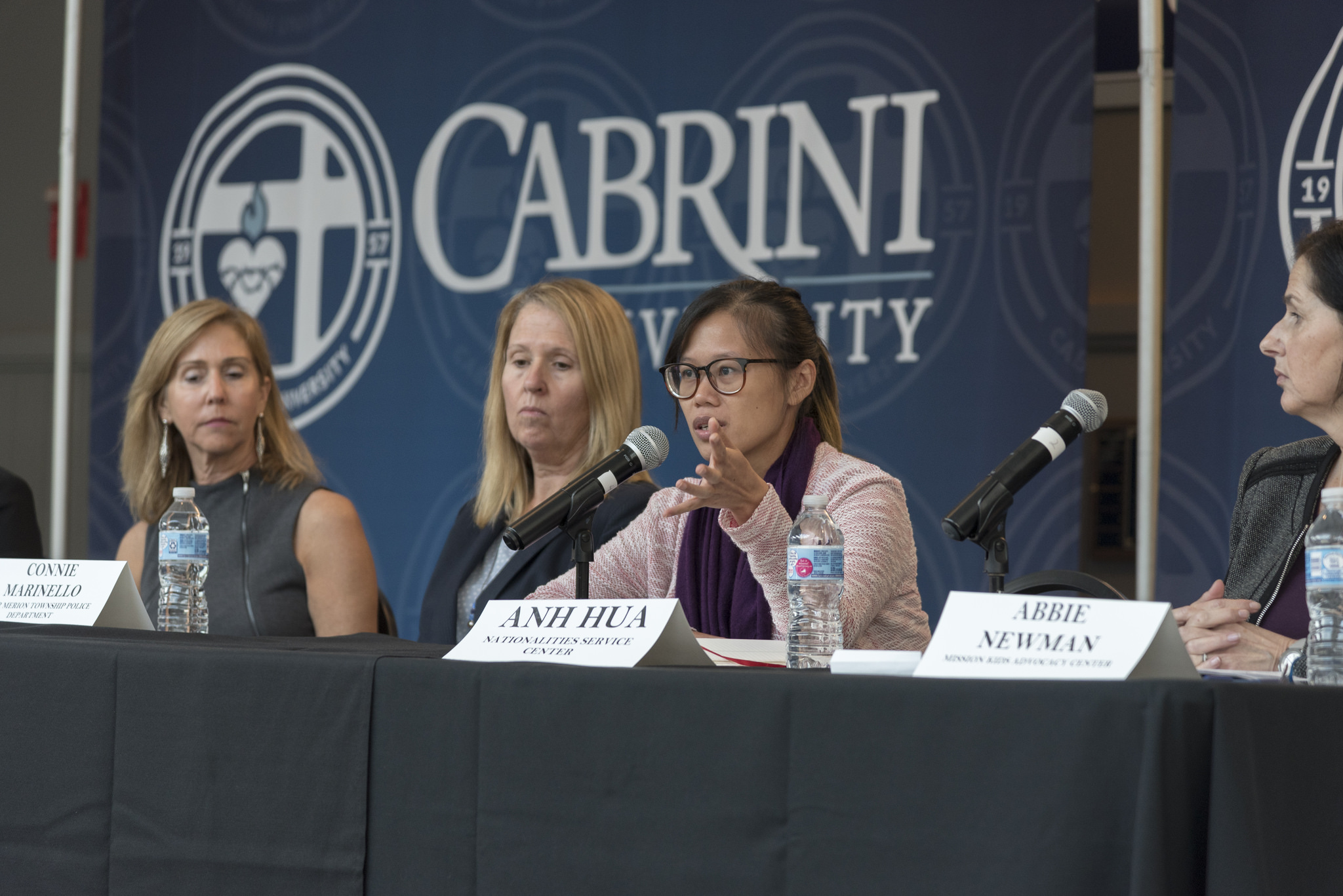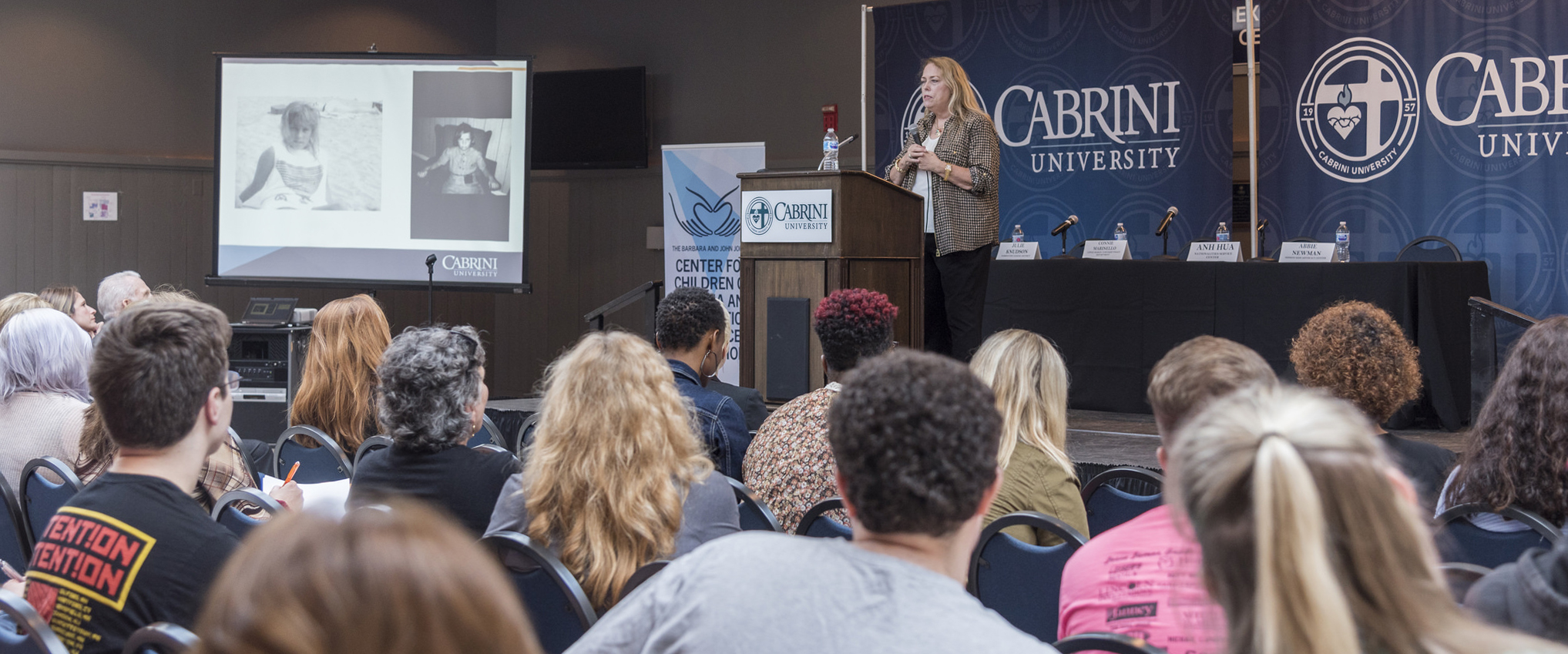On Oct. 2, Cabrini hosted its eighth annual Domestic Violence Symposium co-hosted by the Barbara and John Jordan Center for Children of Trauma and Domestic Violence Education and the Center on Immigration. This year the main focus was on trauma and trafficking.
In observance of Domestic Violence Awareness Month, the symposium hosted keynote speaker Barbara Amaya and five experts for a panel discussion on ways to address and combat human trafficking.
“40.3 million people are the victims of trafficking,” said Mark Kiselica, PhD, Acting Provost and Vice President for Academic Affairs, in his opening remarks. “We are named after Frances Xavier Cabrini, who over 100 years ago started a small group of Catholic sisters that gradually grew over time and went around the world starting institutions where they collectively and repeatedly stood up to people whose goal was to exploit other people. These were women of courage and they did it time and time again … that work carries on today through this symposium.”
Amaya, a survivor-leader in the movement to end human trafficking and all violence against women, presented her personal account of the effects of trafficking and domestic violence.
At age 12, Amaya decided to run away from her home in Fairfax, VA, to escape repeated sexual abuse that had been going on for years. Traffickers then took advantage of Amaya’s vulnerability. For more than a decade, until she was 24, Amaya spent life on the streets of New York City as a victim of domestic minor sex trafficking.
“I quickly came to understand that when an adult offered me to stay in their home, there was going to be a price to pay,” Amaya said. “It wasn’t out of kindness that people were offering me, a 12-year-old child, a place to stay.”
“I never got my hands on any of the money, I never thought about the money,” she said. “I wanted someone to care for me and make me feel like I mattered. I needed someone to love me and they [the traffickers] acted like they were supplying this in a horrible evil way.”
Amaya went on to explain the strength of a trauma bond, which is very similar to Stockholm Syndrome. The bond becomes the main form of control for sex traffickers and causes those being trafficked so much fear that most times they refuse to tell authorities they are in trouble or just flee the situation.
“I wasn't chained in a basement, but there were mental chains that were in place that were much stronger than any metal chain would have ever been,” she said.
In 2012, Amaya had an epiphany after watching a newscast about trafficked teens. She turned the volume up when they started to talk about the recruiting techniques that traffickers use. That is when she realized, for the first time in her entire life, that she was a victim of human trafficking. Amaya went to a drug clinic on Manhattan’s east side and the intake person took time to go above and beyond her scope of work to propel Amaya out of a life of trafficking in New York City.
Following Amaya, the panel of speakers included Anh Hua, an Anti-Human Trafficking Program Manager; Detective Connie Marinello; Laura Clary, BSN, RN, FNE-A/P, SANE-A, CFN, who works as a Sexual Assault Forensic Examination Clinical Program Manager; Julie Knudsen, a LSW Pupil Services Supervisor in the Norristown School District; and Abbie Newman, RN, JD, the CEO and Founding Executive Director, Mission Kids Advocacy Center.

The overarching message emphasized during their panel session was the importance of the community coming together to help address and combat human trafficking.
“It takes a village,” Newman said. “There is no way that any one agency, any one person can do this alone. It has got to be a huge, huge, huge community effort with every single partner that you can think about that might build an inch. That is what we are working on as a county.”
Hua said, “There is no one type of victim, one type of trafficker. We need to recognize that anyone could be a victim.”
For anyone who may be affected by human trafficking or trauma, Cabrini offers counseling services in Grace Hall, Room 147.
